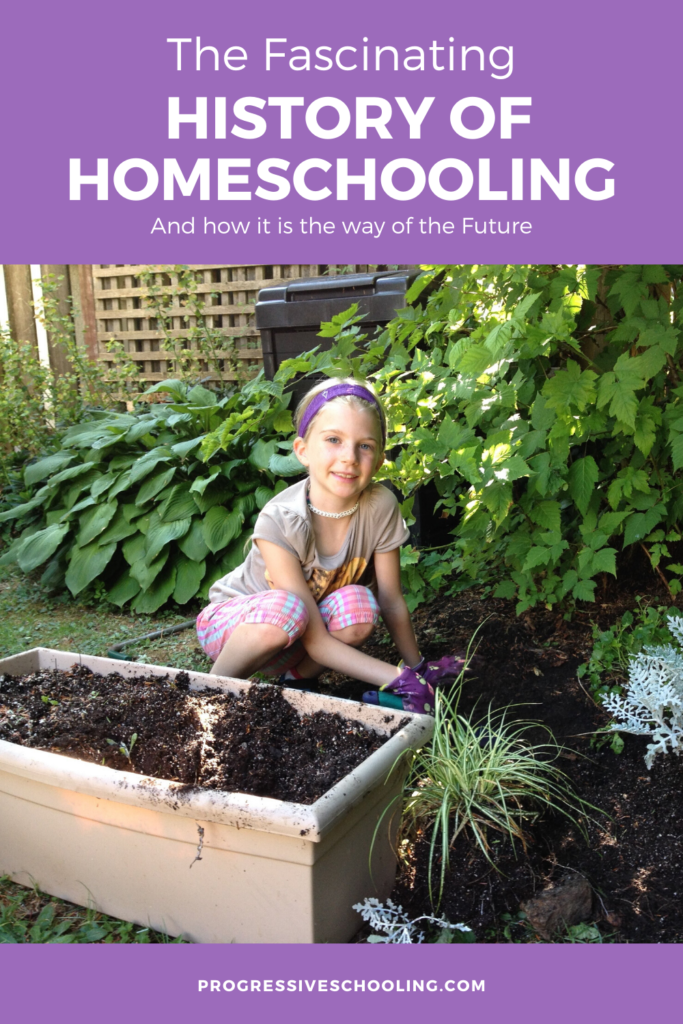
Homeschooling is the oldest type of education and has been around for many centuries. Homeschooling has had its ups and downs over the centuries, from being being the only type of education to being illegal.
Homeschooling used to be the only form of education, but in the 18th century public schools started taking over. Homeschooling eventually came back in the 1970s, but it was mainly just religious families. But after time more parents were finding flaws in the school systems and deciding to homeschool.
From the beginning of time to now homeschooling has been all over the place. Keep reading to find out what it used to be like, why and when it became illegal, and how it revived from that.
History of Homeschooling
Homeschooling dates back to the beginning of time when kids would just learn through their surroundings. Up until the 18th century most kids were taught at home learning through self-directed play and education. Really it was the only form of education until the idea of public schools spread. It developed from the 16th to 19th century, as the supporters had their own ideas of what children should learn.
Employers in industry were promoting schools because they saw it as a way to create better workers. They thought that the most crucial lessons were the duller subjects so that students would learn to listen well. People began thinking of schooling as their children’s work, and the nation saw it as creating good patriots and soldiers. Back then public schools were very strict and if you got a bad grade you would be punished or physically hurt. But over time the schools changed to be a little bit more relaxed, but still very grade oriented.
Eventually public schools turned more into conventional schools and became mandatory, so it was illegal to homeschool. In the United States if parents tried to homeschool their kids they could loose their parenting rights. This went on until the 20th century, it was just the norm, until the 1960s when people started questioning the value of conventional school systems and the overall quality of education kids were receiving. A few books were published about it and that’s when parents started realizing the flaws in conventional school.
Studies started to happen about schools having a negative impact on children’s physical and mental growth and development. So John Holt (homeschool activist) founded Holt Associates in 1969 and started advocating for parents to not just homeschool but unschool their kids. He also later on founded Growing Without Schooling a magazine devoted to homeschooling and unschooling. In 1971 Ivan Illich published a book called Deschooling, which criticized the conventional school systems. He was convinced that they take away students’ creativity and unique ideas, and teach kids to all be the same.
More and more books were being published, and statements were being made about school systems. Between 1970s and 1990s homeschooling became legal in all the states. The Homeschool Legal Defense Association (HSLDA) was founded by 2 attorneys, Mike Farris and Mike Smith. It is a christian homeschool organization, that helped the make homeschooling legal.
Eventually countries around the world started legalizing homeschooling. Homeschooling is not legal everywhere but it sure seems to be headed in that direction. When it originally started becoming legal, families were mainly homeschooling for religious reasons. There was a huge Christian homeschooling movement which started out in the 1960s and was very popular in the 80s. Christian parents would homeschool their kids because they felt like the school system does not teach enough about their religion. So as part of the kids curriculum they integrated their religious values into their learning. In the 1990s homeschooling communities started to grow, but they were explicitly for christian homeschoolers.
Now parents aren’t homeschooling just for religion anymore. The Christian homeschool communities are still very popular, but people have started homeschooling for other reasons. Some might be homeschooling because of the flaws they see in the conventional school system. Some might be doing it because they think their kids will have a better education at home. Whatever the reason is I’m sure words getting around because of the popularity of homeschooling now.
They started keeping track of the amount of homeschoolers in the U.S. in 1999. There were around 850,000 kids being homeschooled. In 2012 there were around 1.7 million, which was 3.4% of the population of students. And as of 2019 there were 2.5 million students being homeschooled. Homeschooling is growing at a fast rate all around the world now.
Why is it Easier to Homeschool Now?

It is easier to homeschool now than it was 20 years ago because of technology. With technology students can learn so much, here are the reasons to why technology makes homeschool in the 21st century much easier.
Learning: There are online schools now. Kids can take classes online and learn just as much or more through their online courses. In high school there are a lot of online classes for teens, but homeschool students can also take them, and even take enough to graduate with a high school diploma. There are also online academy’s that don’t really have guidelines, like Khan Academy. With online education like this you can choose what subject your kid should learn based on their interest instead of doing online sources through the public school system.
Socialization: You’ve probably heard the homeschool and socialization myth. It’s the first thing people ask about when you say you are homeschooled. It might have been true back in the 1980s, but now with social media that myth is gone. If your kid is old enough they might be on social media. There could be a group of homeschooled teens that your teen can join and make friends through it. Even if they have younger kids, parents can be the ones socializing with other homeschool parents and maybe they can plan play dates. Plus there are a lot of homeschooling communities online and on facebook which may do meetups once a week.
Work: Technology makes work so much easier for homeschool parents. It used to be hard to homeschool kids because parents needed to work and make money, and not many families could afford to only have one working parent. But now with modern day technology parents can work online full time and part time. That way they can still make money and homeschool their kids.
Create: Homeschool kids, especially older ones have the opportunity to create art online now. A lot of teens and kids are into playing and making video games, coding, using photoshop or making videos. Technology lets teens be creative in their own ways through using programs online. Students learn a lot through the creative process. It’s like doing a digital class in school but better because students can learn more in depth of what they want to learn through online creative projects. If kids were in school they wouldn’t have any time to learn all these things.
Homeschooling Pros and Cons
Pros
I’m not going to list all of the pros to homeschooling because that would take way too long, but here are a few.
Homeschoolers get a better education because they learn more through a hand on approach. They get to learn more about what they enjoy doing so when they learn they might be more engaged because they actually find it interesting. They also have a closer relationship with their parents because they get to spend a lot of time together.
Homeschoolers can accomplish things in a lot less time than it takes to learn in regular schools. That’s because there are no distractions, there is less time wasted and their learning is personalized so that if they don’t understand something the teacher/parent can elaborate.
Homeschoolers have higher self esteem and grow up being themselves, not trying to change because of what everyone else is doing. Plus there is less or no peer pressure and bullying as a homeschooler. They might also have a healthier lifestyle by getting more sleep, and having less stress about their grades and homework. They will also have more time to be creative and grow through self directed learning and play.
Cons
If your kid is the type of person who needs to socialize with their friends everyday, they might not be able to get that with homeschooling. Some people get really bored without seeing their friends everyday at school. But you could find homeschool groups in your area that meetup often. Homeschooling can be stressful for parents if you’re trying to follow the curriculum or even being with your kid all the time. They don’t get any feedback on what they’re doing right and wrong so it can be worrisome that their kids aren’t learning enough.
Other people might look at you differently if you decide to homeschool your kids. There are so many myths about homeschoolers, and people who don’t know much about it totally believe those myths. You’ll have to deal with those people asking you why your kids aren’t in school. It can be a bit annoying.
